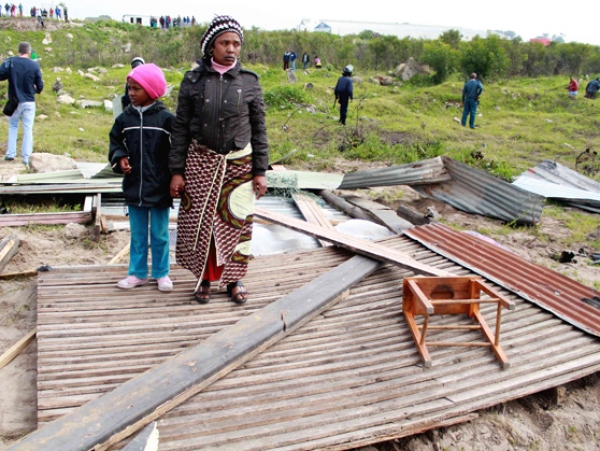

A woman and her child after their home was demolished in Marikana settlement, Philippi East, Cape Town. 11 August 2014. Photo by Masixole Feni.
13 August 2014
The City of Cape Town has invoked a series of court interdicts and orders to defend its role in the evictions of shackdwellers in Philippi East. The land occupation has grown since last week. City Law Enforcement resumed the demolition and removal of shacks on a plot off Symphony Way today, resulting in violent clashes.
The most recent court order was obtained on 7 August by the owner of Erf 149 in response to the sudden occupation. A draft order, handed down by Judge Patrick Gamble in the Western Cape High Court, was sought and obtained by land owner Copper Moon Trading (PTY) Ltd. It calls on the first respondents (understood to be the occupants of 69 completed shacks on the property) to motivate in court why the order against further occupation should not be made final on 28 August. The order interdicts the erection of any new structures. The land owner, assisted by the sheriff of the court, is authorised to remove people in breach of the order, demolish structures and confiscate building materials for three months.
The City maintains that it did not evict or “remove” anyone. Explaining City Law Enforcement’s role, JP Smith, Mayoral Committee Member for Safety and Security, said: “On Monday [11 August] Law Enforcement did not remove anyone, instead they were preventing further invasion of the land since all individuals invading the land were in contempt of the High Court order obtained by the private landowner. Only uncompleted and vacant structures were removed.”
Smith said that Law Enforcement further attempted to prevent the offloading of building materials, but their efforts were thwarted by a violent crowd of “illegal” occupants, who attacked the City officers.
A matter in which the City also removed what it called uncompleted and vacant structures at the Marikana settlement in January on an adjacent plot off Symphony Way is currently before the Western Cape High Court.
In affidavits to the court, Steven Hayward, head of the City’s Anti-Land Invasion Unit (ALIU), claimed that only vacant and unoccupied structures were demolished. Lawyers for the evictees, led by Sheldon Magardie of the Legal Resources Centre, challenged this. They argued that City officials do not have jurisdiction to rule, ad-hoc, on the state of completion and occupation of a shack. Importantly, no legal definitions exist for the criteria of completion and occupation.

A young man takes his belongings as City law enforcement move in. Marikana settlement, Philippi East, Cape Town. 11 August 2014. Photo by Masixole Feni.
Judge Patrick Gamble ruled in favour of the evictees in March, and called the evictions unlawful and unconstitutional. But the City successfully appealed the judgment and the Supreme Court of Appeals (SCA) has referred the matter back to the High Court for oral evidence to be heard. With Gamble’s judgment set aside, no legal precedents exist for challenging the City’s definition of what qualifies as an occupied or completed shack.
Smith has also stuck by his accusations against Ses’khona Peoples Rights Movement, which the City claims orchestrated the land occupation as a political ploy to make the municipality “ungovernable”:
“The City can confirm that Andile Lili (of Ses’khona) has been actively involved. We have photographic evidence of this. Reports from various land invaders to officials on the ground, indicate that SesKhona had given them permission to invade the land. Lili has held meetings with the land invaders.”
In a press release, Smith stated that the current “land-grab” had the potential to be of an “unprecedented” scale.
Read more Cops beat and humiliate evicted shackdwellers in Philippi East and Philippi eviction: Sheriff contradicts City’s JP Smith.